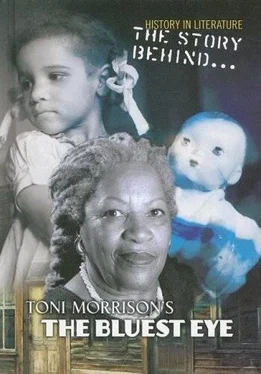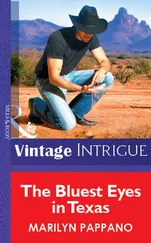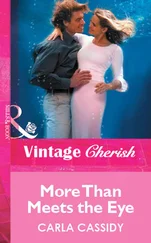Instead we saw Mr. Henry and two women. In a playful manner, the way grandmothers do with babies, he was sucking the fingers of one of the women, whose laughter filled a tiny place over his head. The other woman was buttoning her coat. We knew immediately who they were, and our flesh crawled. One was China, and the other was called the Maginot Line. The back of my neck itched.
These were the fancy women of the maroon nail polish that Mama and Big Mama hated. And in our house. China was not too terrible, at least not in our imaginations. She was thin, aging, absentminded, and unaggressive. But the Maginot Line. That was the one my mother said she "wouldn't let eat out of one of her plates." That was the one church women never allowed their eyes to rest on. That was the one who had killed people, set them on fire, poisoned them, cooked them in lye. Although I thought the Maginot Line's face, hidden under all that fat, was really sweet, I had heard too many black and red words about her, seen too many mouths go triangle at the mention of her name, to dwell on any redeeming features she might have. Showing brown teeth, China seemed to be genuinely enjoying Mr. Henry. The sight of him licking her fingers brought to mind the girlie magazines in his room. A cold wind blew somewhere in me, lifting little leaves of terror and obscure longing. I thought I saw a mild lonesomeness cross the face of the Maginot Line. But it may have been my own image that I saw in the slow flaring of her nostrils, in her eyes that reminded me of waterfalls in movies about Hawaii. The Maginot Line yawned and said, "Come on, China. We can't hang in here all day. Them people be home soon." She moved toward the door. Frieda and I dropped down to the ground, looking wildly into each other's eyes. When the women were some distance away, we went inside. Mr. Henry was in the kitchen opening a bottle of pop.
"Back already?"
"Yes, sir."
"Cream all gone?" His little teeth looked so kindly and helpless. Was that really our Mr. Henry with China 's fingers? "We got candy instead."
"You did huh? Ole sugar-tooth Greta Garbo." He wiped the bottle sweat and turned it up to his lips-a gesture that made me uncomfortable.
"Who were those women, Mr. Henry?" He choked on the pop and looked at Frieda. "What you say?"
"Those women," she repeated, "who just left. Who were they?"
"Oh." He laughed the grown-up getting-ready-to-lie laugh. A heh-heh we knew well. "Those were some members of my Bible class. We read the scriptures together, and so they came today to read with me."
"Oh," said Frieda. I was looking at his house slippers to keep from seeing those kindly teeth frame a lie. He walked toward the stairs and then turned back to us. "Bed' not mention it to your mother. She don't take to so much Bible study and don't like me having visitors, even if they good Christians."
"No, sir, Mr. Henry. We won't." He rapidly mounted the stairs. "Should we?" I asked. "Tell Mama?" Frieda sighed. She had not even opened her Powerhouse bar or her potato chips, and now she traced the letters on the candy wrappers with her fingers. Suddenly she lifted her head and began to look all around the kitchen. "No. i guess not. No plates are out."
"Plates? What you talking about now?"
"No plates are out. The Maginot Line didn't eat out of one of Mama's plates. Besides, Mama would just fuss all day if we told her," We sat down and looked at the graham-cracker anthills we had made. "We better cut off the turnips. They'll burn, and Mama will whip us," she said.
"I know."
"But if we let them burn, we won't have to eat them."
"Heyyy, what a lovely idea," I thought. "Which you want? A whipping and no turnips, or turnips and no whippings?"
"I don't know. Maybe we could burn them just a little so Mama and Daddy can eat them, but we can say we can't. "
"O.K." I made a volcano out of my anthill. "Frieda?"
"What?"
"What did Woodward do that you was gonna tell?"
"Wet the bed. Mrs. Cain told Mama he won't quit."
"Old nasty." The sky was getting dark; I looked out of the window and saw snow falling. I poked my finger down into the mouth of my volcano, and it toppled, dispersing the golden grains into little swirls. The turnip pot crackled.
SEETHECATITGOESMEOWMEOWCOMEANDPLAYCOMEPL AYWITHJANETHEKITTENWILLNOTPLAYPLAYPLAYPLA They come from Mobile. Aiken. From Newport News. From Marietta.
From Meridian. And the sounds of these places in their mouths make you think of love. When you ask them where they are from, they tilt their heads and say " Mobile " and you think you've been kissed. They say "Aiken" and you see a white butterfly glance off a fence with a torn wing. They say "Nagadoches" and you want to say "Yes, I will." You don't know what these towns are like, but you love what happens to the air when they open their lips and let the names ease out. Meridian. The sound of it opens the windows of a room like the first four notes of a hymn. Few people can say the names of their home towns with such sly affection.
Perhaps because they don't have home towns, just places where they were born. But these girls soak up the juice of their home towns, and it never leaves them. They are thin brown girls who have looked long at hollyhocks in the backyards of Meridian, Mobile, Aiken, and Baton Rouge. And like hollyhocks they are narrow, tall, and still. Their roots are deep, their stalks are firm, and only the top blossom nods in the wind. They have the eyes of people who can tell what time it is by the color of the sky. Such girls live in quiet black neighborhoods where everybody is gainfully employed. Where there are porch swings hanging from chains. Where the grass is cut with a scythe, where rooster combs and sunflowers grow in the yards, and pots of bleeding heart, ivy, and mother-in-law tongue line the steps and windowsills.
Such girls have bought watermelon and snapbeans from the fruit man's wagon. They have put in the window the cardboard sign that has a pound measure printed on each of three edges- 10 lbs., 25 lbs., 50 lbs.-and no ice on the fourth. These particular brown girls from Mobile and Aiken are not like some of their sisters. They are not fretful, nervous, or shrill; they do not have lovely black necks that stretch as though against an invisible collar; their eyes do not bite. These sugar-brown Mobile girls move through the streets without a stir. They are as sweet and plain as buttercake. Slim ankles; long, narrow feet.
They wash themselves with orange-colored Lifebuoy soap, dust themselves with Cashmere Bouquet talc, clean their teeth with salt on a piece of rag, soften their skin with Jergens Lotion.
They smell like wood, newspapers, and vanilla. They straighten their hair with Dixie Peach, and part it on the side. At night they curl it in paper from brown bags, tie a print scarf around their heads, and sleep with hands folded across their stomachs.
They do not drink, smoke, or swear, and they still call sex "nookey." They sing second soprano in the choir, and although their voices are clear and steady, they are never picked to solo.
They are in the second row, white blouses starched, blue skirts almost purple from ironing. They go to land-grant colleges, normal schools, and learn how to do the white man's work with refinement: home economics to prepare his food; teacher education to instruct black children in obedience; music to soothe the weary master and entertain his blunted soul. Here they learn the rest of the lesson begun in those soft houses with porch swings and pots of bleeding heart: how to behave. The careful development of thrift, patience, high morals, and good manners.
In short, how to get rid of the funkiness. The dreadful funkiness of passion, the funkiness of nature, the funkiness of the wide range of human emotions. Wherever it erupts, this Funk, they wipe it away; where it crusts, they dissolve it; wherever it drips, flowers, or clings, they find it and fight it until it dies. They fight this battle all the way to the grave. The laugh that is a little too loud; the enunciation a little too round; the gesture a little too generous. They hold their behind in for fear of a sway too free; when they wear lipstick, they never cover the entire mouth for fear of lips too thick, and they worry, worry, worry about the edges of their hair.
Читать дальше











